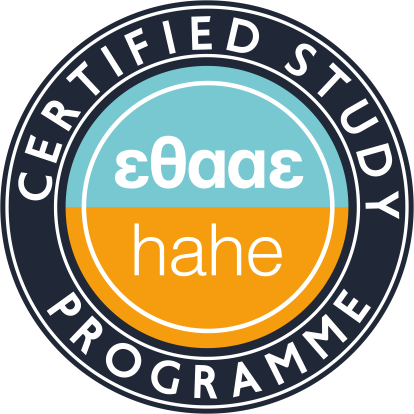Theory and Practice of Musical Improvisation
Course Code (in greek): ΚΤ1365
ECTS Units: 5
Semester: 6
Professor: Adjunct Professor
Course description
Critical examination of the concept of improvisation and its manifestation in different musics and forms of musical practice. Approaches to the role of improvisation in education. Sustained engagement with music improvisation practice, so as to foster the development of an in-depth understanding of improvised music-making and its educational potential.
Learning outcomes
In this course students are expected to
- critically discuss various definitions of improvisation as well as its relationship with related notions of composition, performance and listening, as well as with the concepts of invention, variation, and indeterminacy
- acquire a basic understanding of the multiplicity of improvisational practices in various musics
- discuss how children employ improvisational process in different contexts
- aknowledge the importance of music improvisation in music education
- improvise, solo, or in groups, based on a variety basic of improvisational techniques
Assessment
Assessment takes place at the end of the term and involves (a) written exams (b) presentation of an improvised performance that employs specific improvisational techniques and formats studied in the course of our meetings.
Teaching methods
Direct involvement in improvisational activities both in large and small groups, lectures, reflective dialogical inquiry centered on issues that emerge in our practical work.
Recommended literature
Addison, R. (1988). A new look at musical improvisation in education. British Journal of Music Education, 5(3), 255-267.
Agrell, J. (2008). Improvisation Games for Classical Musicians: 500+ Non-jazz Games for Performers, Educators, and Everyone Else. Chicago: GIA Publications.
Alperson, P. (1984). On musical improvisation. The Journal of Aesthetics and Art Criticism, 43(1), 17-29.
Bailey, D. (1992). Improvisation. London: The British Library National Sound Archive.
Basic, E. (1988). O Aυτοσχεδιασμός ως Δημιουργικό Mήνυμα. Στο Wolfgang Stumme (επιμ.), O Aυτοσχεδιασμός. Αθήνα: Νάσος.
Benson, B. E. (2003). The Improvisation of Musical Dialogue: A Phenomenology of Music. Cambridge: Cambridge University Press.
Berliner, P. F. (1994). Thinking in Jazz: The Infinite Art of Improvisation. Chicago: The University of Chicago Press.
Brockmann, N. M. (2009). From Sight to Sound: Improvisation Games for Classical Musicians. Μπλούμινγτον: Indiana University Press.
Campbell, P. S. (2009). Learning to improvise music, improvising to learn music. . In G. Solis & B. Nettl (Eds.), Musical Improvisation: Art, Education, and Society (pp. 119-142). Urbana: University of Illinois Press.
Fischlin. D. , Heble, A. , Lipsitz, G. (Eds.) (2013). The Fierce of Now: Improvisation, Rights, and the Ethics of Co-creation. Durham: Duke University Press.
Green, L. (2014). Άκου, Ακροάσου, Παίξε!: Πώς να απελευθερώσετε την ακουστική αντίληψη των μαθητών σας και τις δεξιότητές τους στον αυτοσχεδιασμό και στην εκτέλεση. Aθήνα: Φαγκότο.
Goldstaub, Paul. (1996). Opening the door to classroom improvisation. Music Educators Journal, 82(5), 45-51.
Hall, E. T. (1992). Improvisation as an acquired, multilevel process. Ethnomusicology, 36(2), 223-235.
Hickey, M. (2009). Can improvisation be taught? A call for free improvisation in our schools. International Journal of Music Education,27(4), 285–299.
Hobsbawm, E. (1988). Η Σκηνή της Τζαζ (μτφρ. Τ. Τσήρος). Αθήνα: Εξάντας
Horsley, I., Collins, M., Badura-Scoda, E. & Libby, D. (1980). Improvisation in Western Art Music. In S. Sadie (Ed.), The New Grove Dictionary of Music and Musicians, Vol. 9 (pp. 31-52). London: Macmillan.
Ingold, T. , Hallam, E. (2007). Creativity and Cultural Improvisation: An Introduction. Στο Ε. Hallasm & Τ. Ingold (επιμ.), Creativity and Cultural Improvisation. Oxford: Berg Publishers.
Johnstone, Κ. (1981/2010). Impro, o Aυτοσχεδιασμός στο Θέατρο (μτφρ. Α. Γαρεφαλάκη). Αθήνα: Εκδόσεις Οκτώ.
Jensen. M. (2009). Making the Contours of the Eternal Moment: Indeterminate Scores 2002-2009. Kingston, NY: Deep Listening Institute.
Kanellopoulos, P. A. (2007) Musical Improvisation as Action: An arendtian perspective, Action, Criticism, and Theory for Music Education,6:3, pp. 97-127, available at: http://act.maydaygroup.org/articles/Kanellopoulos6_3.pdf Accessed 11/16/2007.
Kanellopoulos, P. Α. (2007). Children’s early reflections on improvised music-making as the wellspring of musico-philosophical thinking. Philosophy of Music Education Review, 15(2), 119-141.
Kanellopoulos, P. Α. (2011). Freedom and Responsibility in Musical Improvisation: A view from Bakhtin. Philosophy of Music Education Review, 19(2), 113-135.
Kanellopoulos, P. Α. (2012). Envisioning Autonomy through Improvising and Composing: Castoriadis visiting creative music education practice. Educational Philosophy and Theory, 44(2), 151-182.
Keyes, C. (2000). Teaching improvisation and 20th century idioms. Music Educators Journal, 86(6), 17-22.
Kratus, J. (1991). Growing with improvisation. Music Educators Journal, 78(4), 35-40.
Kratus, J. (1995). A developmental approach to teaching music improvisation. International Journal of Music Education, 26(2), 27-38.
Murray-Schafer, R. (1986). The Thinking Ear. Toronto: Arcana.
Nettl, B. , Russell, M. (επιμ.) (1998). In the Course of Performance: Studies in the World of Musical Improvisation. Chicago: The University of Chicago Press.
Nettl, B. (1974). On musical improvisation. The Musical Quarterly, 60(1), 1-19.
Nyman, M. (2012). Πειραματική Μουσική (μτφρ. Δανάη Στεφάνου). Αθήνα: Εκδόσεις Οκτώ.
Oliveros. P. (2005). Deep Listening: A Composer’s Sound Practice. NY: iUniverse, Inc.
Oliveros, P. (2004) Harmonic Anatomy: Women in improvisation, in: D. Fischlin & A. Heble (eds) The Other Side of Nowhere: Jazz, improvisation, and communities in dialogue (Middletown, Wesleyan University Press) pp. 50-70.
Ong, W. J. (1982/2001). Προφορικότητα και Εγγραμματοσύνη (μτφρ. Κ. Χατζηκυριάκου). Ηράκλειο: Πανεπιστημιακές Εκδόσεις Κρήτης.
Paynter, J. (1992). Sound and Structure. Cambridge: Cambridge University Press.
Pressing, J. (1984). Cognitive Processes in Improvisation. Στο W. Ray Crozier & A. J. Chapman (Επ.), Cognitive Processes in the Perception of Art. Amsterdam: Elsevier Science Publishers B. V..
Prévost, E. (1995). No Sound is Innocent: AMM and The Practice of Self-Invention. Meta-Musical Narratives. Essays. Essex: Copula.
Reynolds, R. (1965). Indeterminacy: Some considerations. Perspectives of New Music, 4(1), 136-140.
Sarath, E. (2010). Music Theory Through Improvisation: A New Approach to Musicianship Training. New York: Routledge.
Sarath, E. W. (1993). Improvisation for global musicianship. Music Educators Journal, 80(2): 23-26.
Smith, L. (1982). Σημειώσεις για τη Φύση της Μουσικής. Αθήνα: Νεφέλη.
Treitler, L. (1991). Medieval improvisation. The World of Music, 33(3), 66-91.
Vella, R. (2003). Sounds in Space, Sounds in Time. London: Boosey & Hawkes.
Κακούρη, Κατερίνα, Ι. (1965α). Αυτοσχεδιασμός και θέατρο: το λαϊκό πανηγύρι προαιώνια ρίζα. Θέατρο, 22, 79-84.
Κανελλόπουλος, Π. Α. (2010). Προσεγγίσεις στην έννοια και την παιδαγωγική σημασία του μουσικού αυτοσχεδιασμού: σχεδίασμα μιας πρότασης. Μουσικός Λόγος, 9, 5-36.
Κανελλόπουλος, Π. Α. (2013). Αναζητώντας τον ρόλο του Μουσικού Αυτοσχεδιασμού στη Μουσική Εκπαίδευση: Οι παιδαγωγικές δυνατότητες της καλλιέργειας της (μουσικής) ελευθερίας. Μουσικοπαιδαγωγικά, (Επιστημονική Επιθεώρηση της Ελληνικής Ένωσης για τη Μουσική Εκπαίδευση), τ. 11, 5-43.
Κανελλόπουλος, Π. (2010). Σχεδίασμα μιας παιδαγωγικής του ελεύθερου μουσικού αυτοσχεδιασμού. Στο Π. Α. Κανελλόπουλος & Ν. Τσαφταρίδης (Επιμ). Η Τέχνη στην Εκπαίδευση – η Εκπαίδευση στην Τέχνη (σσ.119-146). Αθήνα: Νήσος.
Καστοριάδης, Κ. (2001). Ανθρωπολογία, Πολιτική, Φιλοσοφία: Πέντε Διαλέξεις στη Βόρειο Ελλάδα. Αθήνα: Ύψιλον.
Κιουρτσάκης, Γ. (1983). Προφορική Παράδοση και Ομαδική Δημιουργία: Το Παράδειγμα του Καραγκιόζη. Αθήνα: Κέδρος.
Παπαδημητρίου, Σ. (1979). Θέματα και Πρόσωπα της Σύγχρονης Τζαζ (1950-1970). Θεσσαλονίκη.


